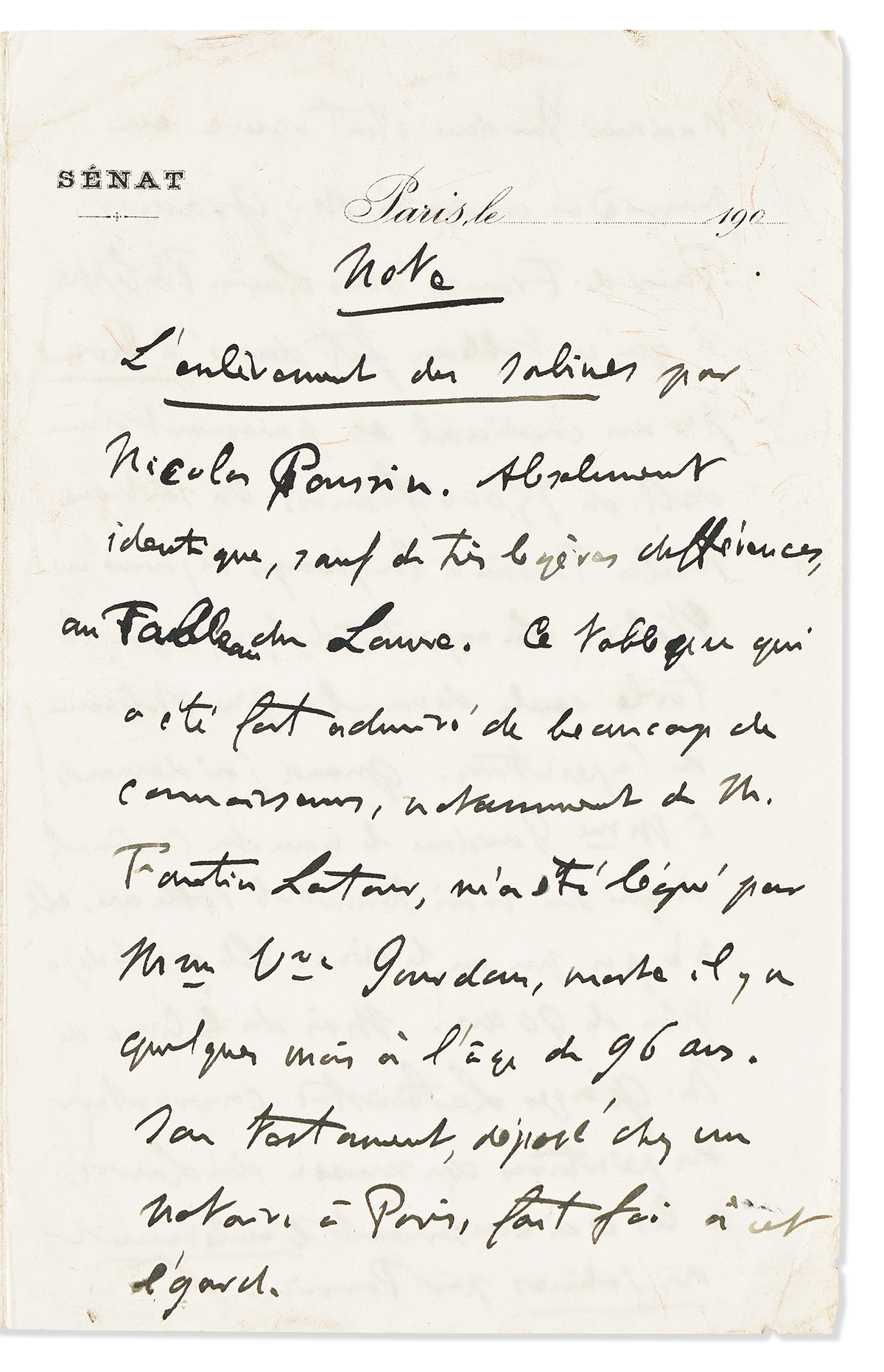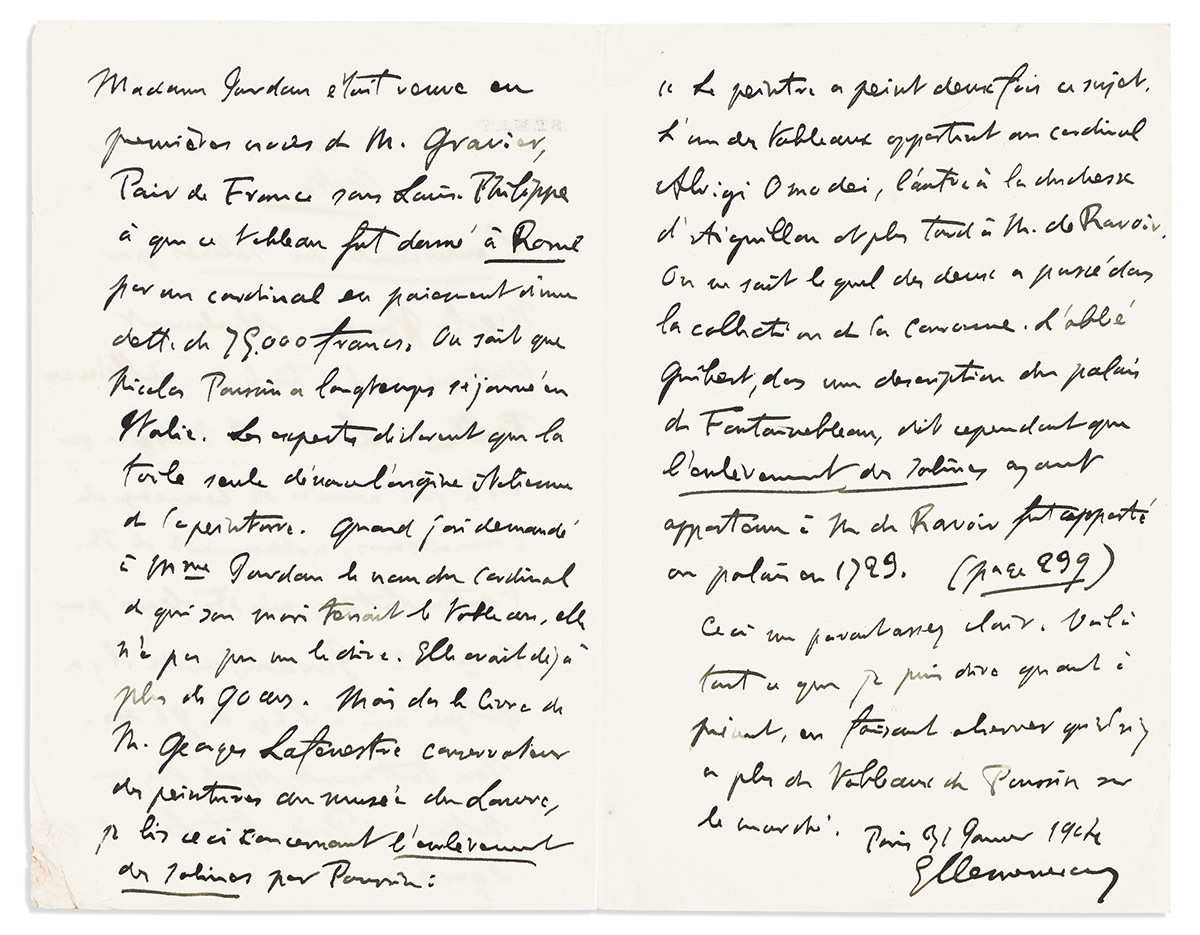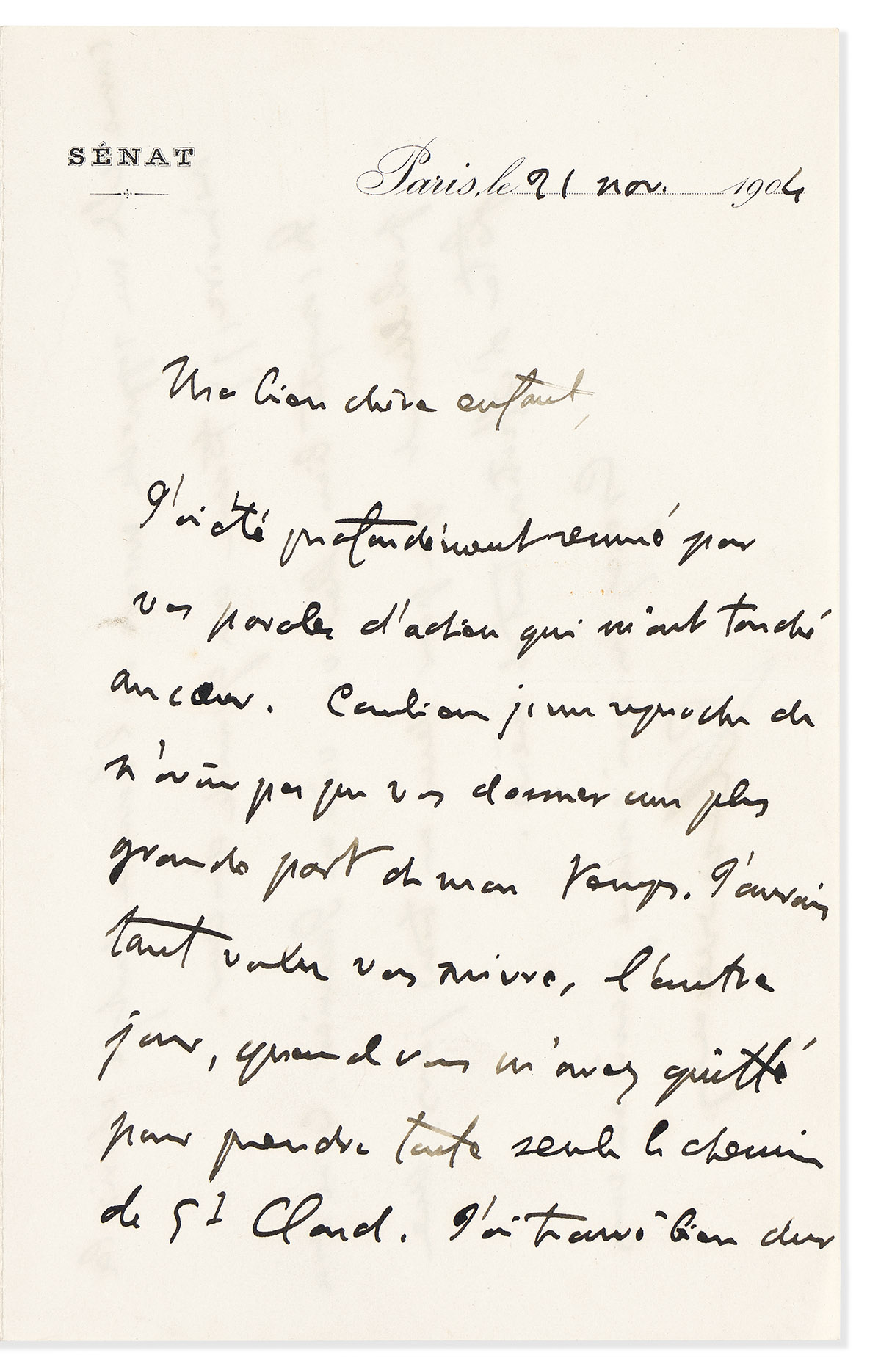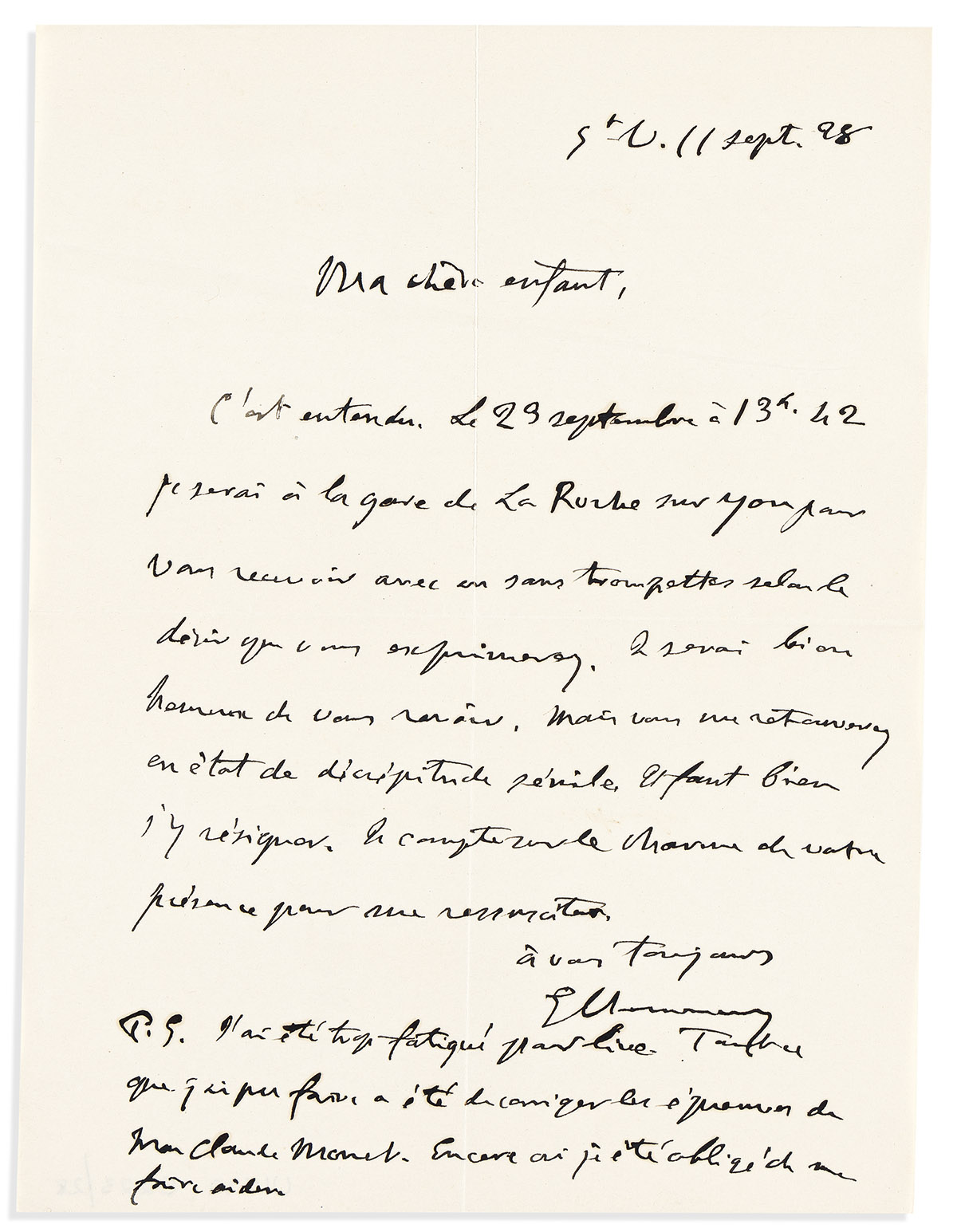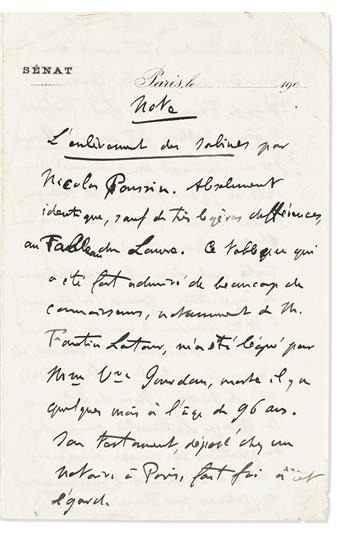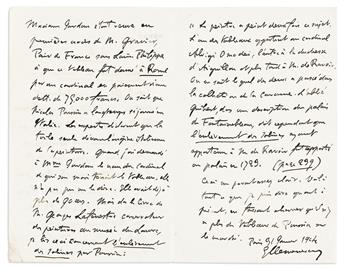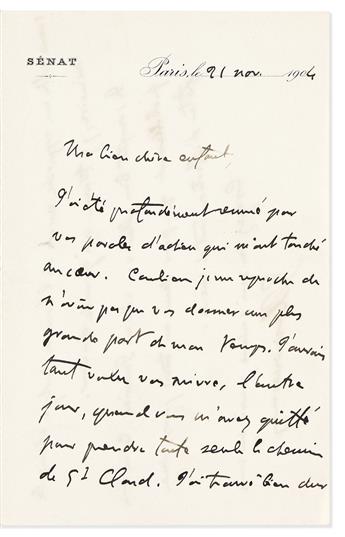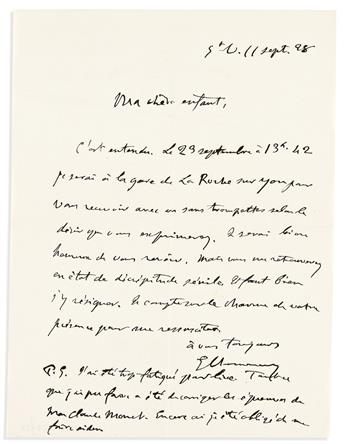Sale 2674 - Lot 95
Price Realized: $ 2,600
Price Realized: $ 3,250
?Final Price Realized includes Buyer’s Premium added to Hammer Price
Estimate: $ 5,000 - $ 7,500
ARCHIVE OF LETTERS FROM FRENCH PREMIER TO LADY EDWARD CECIL CLEMENCEAU, GEORGES. Archive of 37 items, all but one Signed, "GClemenceau" or "G," to Violet Maxse (Lady Edward Cecil and later Viscountess Milner) or her brother Leopold Maxse, in French, including 34 ALsS, an ANS, an AMS, and an AM. The letters to Violet, discussing the provenance for his painting by Nicolas Poussin, expressing his fondness for her and the memory of her father, expressing condolences upon the death of loved ones including her son [George Edward Gascoyne-Cecil, who died in September while serving on the Western Front], arranging meetings, objecting to the German-Russian alliance [the 1922 Treaty of Rapallo], giving travel plans, praising an article by Ernest Rutherford, requesting that she send a book to [Rudyard] Kipling, declining to leave his home in order to complete editing the text of his memoire before death [In the Evening of Thought (1927)], sending copies of his memoire [not present], complaining of poor health, and thanking for permission to publish a report by her deceased husband Alfred Millner. The letters to Leopold, remarking that he follows him in the National Review, sending a translated article [not present], offering to send the original, thanking for payment for articles, and touching on the growing diplomatic tensions between Britain and Germany [in years before WWI]. Together over 60 pages, 4to or 8vo or 12mo, letters to Leopold on Sénat correspondence card or airletter; generally good condition. Nearly all with the original envelope. Vp, 1904-29
Additional Details
To Violet: 31 January 1914: "The Rape of the Sabines by Nicolas Poussin. Absolutely identical, except for very slight differences, to the painting in the Louvre. . . .
"Madame Jourdan was the widow . . . of Mr Gravier, Peer of France under Louis-Philippe, to whom this painting was given in Rome by a cardinal in payment of a debt of 79,000 francs. . . ."
21 November 1904: ". . . Your father loved you in a very special way. With the living memory of affection that I have left of him, I sometimes have the feeling that I don't know my duty towards you. This is apparently just a form of my great friendship. But as it brings me even closer to the man whose memory I cherish, I find great sweetness in it. . . ."
22 January 1915: ". . . It will be a very painful joy to see you again. What to say to you? And what will you say to me? You have, in this catastrophe [death of her son, George], someone for whom you must live. . . ."
9 May 1922: ". . . [The German-Russian alliance] is a cowardice that will have, I fear, the gravest of consequences. . . ."
1 October 1923: ". . . The paper by Sir Ernest Rutherford is first rate from all points of view. I have extracted two great quotations that struck me to use . . . ."
2 May 1926: ". . . Unfortunately, it is absolutely impossible for me to leave my text for the moment. My last revision won't be finished until around 11 October. . . . [A]nd I would like very much not to die before having corrected the proofs, in order that my paper might be what I want. . . ."
24 August 1929: ". . . I've arrived at the point when I have to make my decision. I would like to publish in extense the admirable report of Lord Milner dated March 27, 1918. . . . May I say from whom I have it? . . ."
30 August 1929: ". . . I'll have the document translated and I'll publish it entirely . . . saying that I have it from you. . . ."
To Leopold: 11 July 1904: ". . . I follow you . . . with the National Review, which I read very carefully."
17 October 1904: ". . . Violette writes that she's coming to Paris at the beginning of next month and maybe you will accompany her. . . . The Senate expects you. . . ."
"Monday": ". . . You really think that I judge, as you do, the campaign of Mr [André] Tardieu, against which many of our newspapers protest, beginning with the Figaro. But permit me to tell you that that has nothing to do with the particular point of the matter. I personally have the greatest sympathy for [Fairfax] Cartwright, whom I know to be very anti-German. . . . From the moment the foreign office lies, I am satisfied. . . . Let's not talk any more about it.
"[Edward] Gray gives me the impression of a man who doesn't know very well what he wants. . . ."
Provenance: From the Steve Forbes Collection.
"Madame Jourdan was the widow . . . of Mr Gravier, Peer of France under Louis-Philippe, to whom this painting was given in Rome by a cardinal in payment of a debt of 79,000 francs. . . ."
21 November 1904: ". . . Your father loved you in a very special way. With the living memory of affection that I have left of him, I sometimes have the feeling that I don't know my duty towards you. This is apparently just a form of my great friendship. But as it brings me even closer to the man whose memory I cherish, I find great sweetness in it. . . ."
22 January 1915: ". . . It will be a very painful joy to see you again. What to say to you? And what will you say to me? You have, in this catastrophe [death of her son, George], someone for whom you must live. . . ."
9 May 1922: ". . . [The German-Russian alliance] is a cowardice that will have, I fear, the gravest of consequences. . . ."
1 October 1923: ". . . The paper by Sir Ernest Rutherford is first rate from all points of view. I have extracted two great quotations that struck me to use . . . ."
2 May 1926: ". . . Unfortunately, it is absolutely impossible for me to leave my text for the moment. My last revision won't be finished until around 11 October. . . . [A]nd I would like very much not to die before having corrected the proofs, in order that my paper might be what I want. . . ."
24 August 1929: ". . . I've arrived at the point when I have to make my decision. I would like to publish in extense the admirable report of Lord Milner dated March 27, 1918. . . . May I say from whom I have it? . . ."
30 August 1929: ". . . I'll have the document translated and I'll publish it entirely . . . saying that I have it from you. . . ."
To Leopold: 11 July 1904: ". . . I follow you . . . with the National Review, which I read very carefully."
17 October 1904: ". . . Violette writes that she's coming to Paris at the beginning of next month and maybe you will accompany her. . . . The Senate expects you. . . ."
"Monday": ". . . You really think that I judge, as you do, the campaign of Mr [André] Tardieu, against which many of our newspapers protest, beginning with the Figaro. But permit me to tell you that that has nothing to do with the particular point of the matter. I personally have the greatest sympathy for [Fairfax] Cartwright, whom I know to be very anti-German. . . . From the moment the foreign office lies, I am satisfied. . . . Let's not talk any more about it.
"[Edward] Gray gives me the impression of a man who doesn't know very well what he wants. . . ."
Provenance: From the Steve Forbes Collection.
Exhibition Hours
Exhibition Hours
Aliquam vulputate ornare congue. Vestibulum maximus, libero in placerat faucibus, risus nisl molestie massa, ut maximus metus lectus vel lorem.



